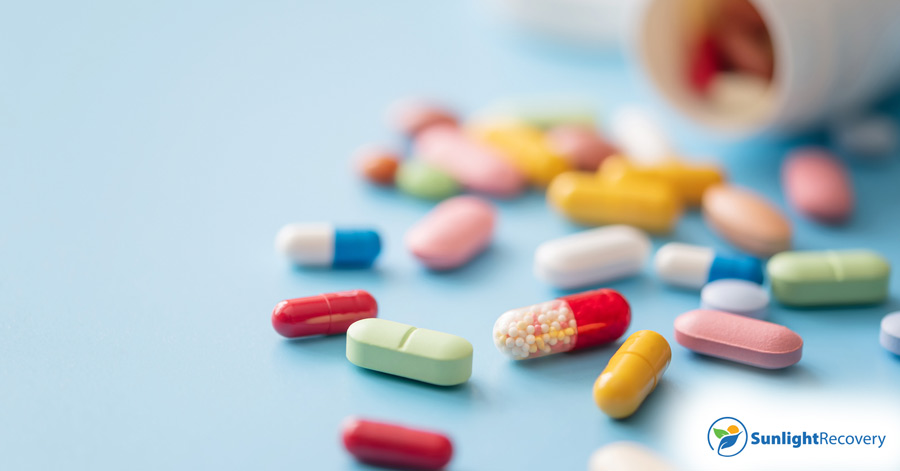Adderall and Xanax are two commonly prescribed psychiatric drugs, and they’re often misused. Many people make the mistake of assuming that mixing amphetamines and benzodiazepines, colloquially known as uppers and downers, simply cancels out or mitigates each drug’s individual effects. Unfortunately, mixing drugs such as Xanax and Adderall can be dangerous or even deadly.
In 2022, nearly 50% of deaths occurring from drug overdoses resulted when users combined two or more drugs. Here’s what you should know about amphetamines and benzos, why taking them together can be so dangerous and when to seek professional help.
What Are Examples of Amphetamines and Their Effects?
Amphetamines are stimulants that increase the speed at which messages travel between the brain and body. Taking an amphetamine typically results in the user feeling more mentally alert and physically active. That’s why students often use these stimulants to stay awake for all-night studying sessions and athletes sometimes take them to boost their performance during a crucial game.
Amphetamines affect the way the body processes dopamine. This can lead to feelings of well-being or euphoria. Dopamine is a “feel-good” chemical, and elevated levels of it can reduce inhibitions and/or cause an individual to believe they’re clear-headed and in control, even if this isn’t true.
Physically, taking amphetamines can increase an individual’s pulse or blood pressure and suppress their appetite. When taken regularly, amphetamines can ultimately lead to insomnia and physical exhaustion. Someone who’s overdosed on these stimulants may also experience agitation, frequent mood changes, paranoia, hallucinations and convulsions. An amphetamine overdose can potentially be lethal.
Doctors sometimes use amphetamines to treat medical conditions such as narcolepsy, binge-eating disorder and attention deficit hyperactivity disorder. Common prescription amphetamines include:
- Adderall
- Concerta
- Dexedrine
- Focalin
- Metadate
- Methylin
- Ritalin
- Vyvanse
Illegal recreational amphetamines may be sold as pills, pastes, liquids, crystals or powders. These drugs may go by street names such as ice, crank, speed or uppers. They may be taken orally or by smoking, snorting or injecting the drug into a vein. The time it takes to feel an amphetamine’s effects depends on the method used to administer it. Whether prescribed by a doctor or taken illicitly, amphetamines are highly addictive.
What Are Examples of Benzodiazepines and Their Effects?
Benzodiazepines act as depressants, slowing the functions of the body and brain, relaxing the muscles and reducing anxiety. This may result in feelings of relaxation or drowsiness.
Although the effects of benzodiazepines can differ depending on whether an individual takes a short-, intermediate- or long-acting drug, this medication can cause amnesia, irritability and vivid — sometimes disturbing — dreams. The effects may be similar to other substances, such as alcohol, barbiturates and sleeping pills.
Whether you take prescription benzodiazepines or illegal street drugs, an overdose can cause additional physical effects, such as confusion, slowed reflexes, excessive drowsiness and impaired coordination. In some cases, overdosing can lead to a coma and/or death.
Doctors often prescribe benzodiazepines as sedatives or tranquilizers to treat patients with muscle spasms, certain types of seizures, severe anxiety or sleep disorders. However, individuals taking this class of drugs can develop a tolerance to them. When misused, they can also be highly addictive. Common prescription benzodiazepines include:
- Ativan
- Halcion
- Klonopin
- Valium
- Xanax
On the street, benzodiazepines are commonly referred to as benzos or downers. These illicit drugs frequently include alprazolam and clonazepam. Although benzos are commonly taken orally, they may also be injected intravenously.
Mixing Aderall and Xanax (or Other Common Amphetamine/Benzodiazepine Combinations)
Mixing medications without being advised to do so by a medical professional is dangerous. However, it’s commonly seen in those struggling with substance abuse. A person who’s addicted to or misusing drugs may intentionally mix multiple medications to explore the effects they have in combination or in an attempt to mitigate negative side effects from one particular drug.
Not all individuals who mix drugs do so recklessly. Sometimes a patient receives prescriptions from more than one doctor. If they fill those prescriptions at different pharmacies, a lack of communication between pharmacies might result in potentially dangerous drug interactions being overlooked.
Another scenario where accidental drug mixing might occur is if someone who’s impaired because of the effects of one drug then takes a second drug without taking into account the risks.
Amphetamines and benzodiazepines commonly taken together include:
- Xanax and Vyvanse
- Klonopin and Adderall
- Valium and Adderall
- Ritalin and Xanax
- Clonazepam and Adderall
- Diazepam and Adderall
Because of the risks of combining drugs, it’s important to advise any medical professionals you visit about the drugs you take. When your doctor is writing a prescription, ask questions about possible drug interactions, such as “Can you take Vyvanse and Adderall together?” Taking this step could help you avoid potentially dangerous situations. It’s also a good idea to disclose any supplements you’re taking, as well as any other prescription and over-the-counter medications.
What Are the Risks of Mixing These Two Medications Illicitly?
Unless you’re directed to do so by a licensed health care professional, you should never mix amphetamines and benzodiazepines. These drugs cause opposing effects on the central nervous system, so by combining them, you’re essentially asking your body to process mixed messages. This can cause excessive stress on your heart and other organs.
Concurrent use of amphetamines and benzodiazepines may also result in the modification or masking of some or all of the effects of both drugs. The resulting complications can be unpredictable and dangerous and may be influenced by numerous factors, including:
- The amount of each medication taken
- The strength of the substances (particularly if they’re acquired on the street)
- The user’s size and weight
- The general health of the person
- An individual’s tolerance to the drugs
- Consumption of additional substances, such as alcohol
Use of amphetamines and benzodiazepines together can lead an individual to increase the dose of both medications to achieve the result they desire or expect. This heightens the risk for addiction, overdose and adverse reactions, such as dehydration, respiratory infections, heart problems and kidney failure. In some cases, mixing these drugs can lead to death.
For those who are abusing uppers and downers, mixing the drugs can create even more complications. Combining the drugs can worsen withdrawal symptoms, making it more difficult to stop using the drugs in question. It also increases the overdose risk, as you can never be sure what you’re taking when you buy a drug on the streets and you don’t know how two drugs may interact.
If You Find Yourself in This Situation Often, It May Be Time to Seek Help
Whether you’re using amphetamines and benzodiazepines recreationally or to treat diagnosed medical conditions, combining these highly addictive drugs without the guidance of a doctor can be deadly. If you find yourself in this situation often or you’re struggling with substance abuse in general, it may be time to seek help.
Contact Sunlight Recovery
Talking to a trained mental health or substance abuse counselor can be the first step toward an effective treatment plan and a better overall quality of life. At Sunlight Recovery, a team of highly experienced medical and clinical professionals is ready to help you step into the clean and sober life you deserve. Contact us today to speak confidentially with one of our compassionate and knowledgeable counselors and start on your path to recovery.






